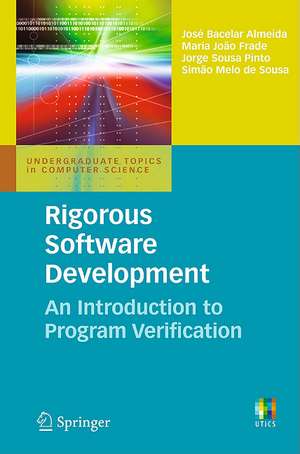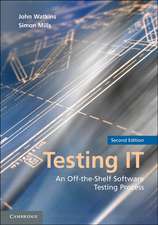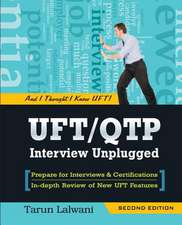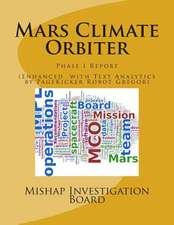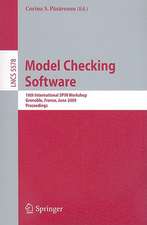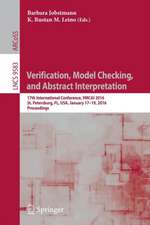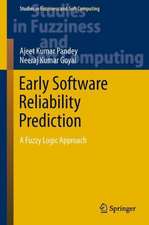Rigorous Software Development: An Introduction to Program Verification: Undergraduate Topics in Computer Science
Autor José Bacelar Almeida, Maria João Frade, Jorge Sousa Pinto, Simão Melo de Sousaen Limba Engleză Paperback – 7 ian 2011
Din seria Undergraduate Topics in Computer Science
- 20%
 Preț: 341.21 lei
Preț: 341.21 lei - 20%
 Preț: 233.75 lei
Preț: 233.75 lei - 20%
 Preț: 318.97 lei
Preț: 318.97 lei - 20%
 Preț: 306.58 lei
Preț: 306.58 lei - 20%
 Preț: 187.22 lei
Preț: 187.22 lei - 20%
 Preț: 192.73 lei
Preț: 192.73 lei - 20%
 Preț: 280.92 lei
Preț: 280.92 lei - 20%
 Preț: 287.02 lei
Preț: 287.02 lei - 20%
 Preț: 305.61 lei
Preț: 305.61 lei - 20%
 Preț: 258.78 lei
Preț: 258.78 lei -
 Preț: 334.88 lei
Preț: 334.88 lei - 20%
 Preț: 246.39 lei
Preț: 246.39 lei - 20%
 Preț: 384.11 lei
Preț: 384.11 lei - 20%
 Preț: 272.43 lei
Preț: 272.43 lei - 20%
 Preț: 316.07 lei
Preț: 316.07 lei - 20%
 Preț: 245.43 lei
Preț: 245.43 lei - 20%
 Preț: 376.75 lei
Preț: 376.75 lei - 20%
 Preț: 350.89 lei
Preț: 350.89 lei - 20%
 Preț: 306.71 lei
Preț: 306.71 lei - 20%
 Preț: 374.37 lei
Preț: 374.37 lei - 20%
 Preț: 225.02 lei
Preț: 225.02 lei - 20%
 Preț: 226.64 lei
Preț: 226.64 lei - 20%
 Preț: 375.53 lei
Preț: 375.53 lei - 20%
 Preț: 395.04 lei
Preț: 395.04 lei - 20%
 Preț: 307.16 lei
Preț: 307.16 lei - 20%
 Preț: 254.37 lei
Preț: 254.37 lei - 20%
 Preț: 227.15 lei
Preț: 227.15 lei - 20%
 Preț: 304.36 lei
Preț: 304.36 lei - 20%
 Preț: 336.99 lei
Preț: 336.99 lei - 20%
 Preț: 316.24 lei
Preț: 316.24 lei - 20%
 Preț: 304.12 lei
Preț: 304.12 lei - 20%
 Preț: 342.45 lei
Preț: 342.45 lei - 20%
 Preț: 276.82 lei
Preț: 276.82 lei - 20%
 Preț: 237.35 lei
Preț: 237.35 lei - 20%
 Preț: 374.20 lei
Preț: 374.20 lei - 20%
 Preț: 304.44 lei
Preț: 304.44 lei - 20%
 Preț: 297.28 lei
Preț: 297.28 lei - 20%
 Preț: 579.37 lei
Preț: 579.37 lei - 20%
 Preț: 298.18 lei
Preț: 298.18 lei - 20%
 Preț: 243.35 lei
Preț: 243.35 lei - 20%
 Preț: 302.80 lei
Preț: 302.80 lei - 20%
 Preț: 297.66 lei
Preț: 297.66 lei - 20%
 Preț: 300.89 lei
Preț: 300.89 lei - 20%
 Preț: 191.35 lei
Preț: 191.35 lei - 20%
 Preț: 278.10 lei
Preț: 278.10 lei - 20%
 Preț: 304.21 lei
Preț: 304.21 lei
Preț: 241.59 lei
Preț vechi: 301.99 lei
-20% Nou
Puncte Express: 362
Preț estimativ în valută:
46.23€ • 48.40$ • 38.25£
46.23€ • 48.40$ • 38.25£
Carte tipărită la comandă
Livrare economică 07-21 aprilie
Preluare comenzi: 021 569.72.76
Specificații
ISBN-13: 9780857290175
ISBN-10: 0857290177
Pagini: 307
Ilustrații: XIII, 307 p. 52 illus.
Dimensiuni: 155 x 235 x 15 mm
Greutate: 0.39 kg
Ediția:2011
Editura: SPRINGER LONDON
Colecția Springer
Seria Undergraduate Topics in Computer Science
Locul publicării:London, United Kingdom
ISBN-10: 0857290177
Pagini: 307
Ilustrații: XIII, 307 p. 52 illus.
Dimensiuni: 155 x 235 x 15 mm
Greutate: 0.39 kg
Ediția:2011
Editura: SPRINGER LONDON
Colecția Springer
Seria Undergraduate Topics in Computer Science
Locul publicării:London, United Kingdom
Public țintă
GraduateCuprins
List of Figures.- 1. Introduction.- 2. An Overview of Formal Methods Tools and Techniques.- 3. Propositional Logic.- 4. First-Order Logic.- 5. Hoare Logic.- 6. Generating Verification Conditions.- 7. Safety Properties.- 8. Procedures and Contracts.- 9. Specifying C Programs.- 10. Verifying C Programs.- Bibliography.- Index.
Recenzii
From the reviews:
“Provide a refreshing approach to a textbook on formal testing and verification methods. … intended for undergraduate students and will be useful to practitioners as well. The authors lay out the topics in incremental fashion … present enough information to foster a good understanding of the theoretical framework supporting formal methods … . The exercises are very useful and provide a practical side to the methods; the references will be vital to practitioners … . Summing Up: Recommended. All undergraduate students, practitioners, and general readers.” (L. Benedicenti, Choice, Vol. 49 (1), September, 2011)
“The first half carefully introduces logic without reference to software, while the second half develops verification techniques. … an undergraduate textbook in computer science and is suitable for well-motivated students willing and able to assimilate the chapters devoted to logic. … Each chapter ends with a very helpful ‘To Learn More’ section … and gives references for further study. … this book will benefit its intended readers and will give them a good foundation in program verification that can be used in applications … .” (Arthur Gittleman, ACM Computing Reviews, December, 2011)
“This book is a concise introduction to formal methods together with an in-depth coverage of model-based and Hoare logic-based methods and focuses on two approaches … . This text is a self-contained introduction to program verification using logic-based methods, presented in the broader context of formal methods for software engineering. Undergraduate students will find this useful in their course.” (CSI eNewsletter, Vol. 4 (1), January, 2013)
“Provide a refreshing approach to a textbook on formal testing and verification methods. … intended for undergraduate students and will be useful to practitioners as well. The authors lay out the topics in incremental fashion … present enough information to foster a good understanding of the theoretical framework supporting formal methods … . The exercises are very useful and provide a practical side to the methods; the references will be vital to practitioners … . Summing Up: Recommended. All undergraduate students, practitioners, and general readers.” (L. Benedicenti, Choice, Vol. 49 (1), September, 2011)
“The first half carefully introduces logic without reference to software, while the second half develops verification techniques. … an undergraduate textbook in computer science and is suitable for well-motivated students willing and able to assimilate the chapters devoted to logic. … Each chapter ends with a very helpful ‘To Learn More’ section … and gives references for further study. … this book will benefit its intended readers and will give them a good foundation in program verification that can be used in applications … .” (Arthur Gittleman, ACM Computing Reviews, December, 2011)
“This book is a concise introduction to formal methods together with an in-depth coverage of model-based and Hoare logic-based methods and focuses on two approaches … . This text is a self-contained introduction to program verification using logic-based methods, presented in the broader context of formal methods for software engineering. Undergraduate students will find this useful in their course.” (CSI eNewsletter, Vol. 4 (1), January, 2013)
Notă biografică
José Bacelar Almeida is a lecturer at the University of Minho, Portugal. He graduated in Electrical and Computer Engineering and received his PhD in Computer Science from the University of Minho. His areas of interest include semantics of programming languages, proof assistants, and security. Maria João Frade obtained her PhD in Computer Science from the University of Minho, Portugal, and is currently a lecturer at this institution. Her research interests include type theory, structural proof theory, semantics of programming languages and program logics. Jorge Sousa Pinto obtained his PhD in Computer Science from École Polytechnique, France, and is currently a lecturer at the University of Minho, Portugal. His interests include program verification and the use of formal methods in software engineering. Simão Melo de Sousa is a lecturer at the University of Beira Interior, Portugal. He graduated in Computer Science from the University of Orléans, France, and received his PhD in Computer Science from the University of Nice-Sophia Antipolis / INRIA. His interests include formal methods, reliability and security of computer systems, and computer-aided reasoning.
Textul de pe ultima copertă
The use of mathematical methods in the development of software is essential when reliable systems are sought; in particular they are now strongly recommended by the official norms adopted in the production of critical software. Program Verification is the area of computer science that studies mathematical methods for checking that a program conforms to its specification. This text is a self-contained introduction to program verification using logic-based methods, presented in the broader context of formal methods for software engineering.The idea of specifying the behaviour of individual software components by attaching contracts to them is now a widely followed approach in program development, which has given rise notably to the development of a number of behavioural interface specification languages and program verification tools. A foundation for the static verification of programs based on contract-annotated routines is laid out in the book. These can be independently verified, which provides a modular approach to the verification of software.The text assumes only basic knowledge of standard mathematical concepts that should be familiar to any computer science student. It includes a self-contained introduction to propositional logic and first-order reasoning with theories, followed by a study of program verification that combines theoretical and practical aspects -- from a program logic (a variant of Hoare logic for programs containing user-provided annotations) to the use of a realistic tool for the verification of C programs (annotated using the ACSL specification language), through the generation of verification conditions and the static verification of runtime errors.
Caracteristici
Self-contained, offering a concise introduction to formal methods together with an in-depth coverage of model-based and Hoare logic-based methods Focuses on two approaches: the Coq proof assistant and the B suite, both of which have proved effective and relevant for industry Includes exercises and solutions making it suitable as a course text and for self-study Includes supplementary material: sn.pub/extras
